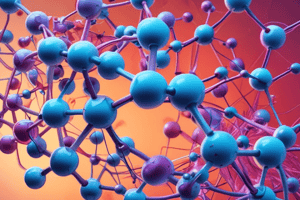Podcast
Questions and Answers
What type of chemical bond can alcohols form due to their structure?
What type of chemical bond can alcohols form due to their structure?
- Metallic bonds
- Hydrogen bonds (correct)
- Covalent bonds
- Ionic bonds
Which functional group is characteristic of carboxylic acids?
Which functional group is characteristic of carboxylic acids?
- Hydroxyl group
- Carbonyl group
- Carboxyl group (correct)
- Amino group
What is the study of the three-dimensional arrangement of atoms in a molecule called?
What is the study of the three-dimensional arrangement of atoms in a molecule called?
- Quantum chemistry
- Physical chemistry
- Stereochemistry (correct)
- Organometallic chemistry
Which type of molecules have non-superimposable mirror images?
Which type of molecules have non-superimposable mirror images?
What role do natural products like antibiotics and vitamins play in organic chemistry?
What role do natural products like antibiotics and vitamins play in organic chemistry?
In what kind of reactions do organic compounds undergo the breaking of old bonds and formation of new bonds?
In what kind of reactions do organic compounds undergo the breaking of old bonds and formation of new bonds?
What is the main characteristic of alkenes that differentiates them from alkanes?
What is the main characteristic of alkenes that differentiates them from alkanes?
Which hydrocarbon has the simplest structure among alkanes, alkenes, and alkynes?
Which hydrocarbon has the simplest structure among alkanes, alkenes, and alkynes?
What type of functional group do alcohols and carboxylic acids belong to?
What type of functional group do alcohols and carboxylic acids belong to?
Why are alkynes more reactive compared to alkenes?
Why are alkynes more reactive compared to alkenes?
Which type of carbon compounds form the backbone of life on Earth?
Which type of carbon compounds form the backbone of life on Earth?
What property makes alkenes have a higher boiling point than alkanes?
What property makes alkenes have a higher boiling point than alkanes?
Flashcards are hidden until you start studying
Study Notes
Exploring the World of Organic Chemistry
Organic chemistry is a fascinating and diverse branch of chemistry that deals with the study of carbon-based compounds, particularly those found in living organisms. These carbon compounds, along with hydrogen, oxygen, and other elements, make up the complex molecules that form the backbone of life on Earth. Here, we'll delve into the exciting world of organic chemistry, starting with its foundations and key concepts.
Molecular Building Blocks: Alkanes, Alkenes, and Alkynes
At the core of organic chemistry, we find the alkanes, alkenes, and alkynes, known collectively as hydrocarbons.
- Alkanes are hydrocarbons with single covalent bonds (C-C) and no double or triple bonds. They're the simplest organic compounds and form the basis of many other more complex molecules.
- Alkenes are hydrocarbons with at least one double covalent bond (C=C). They have a higher boiling point and are more reactive than alkanes due to the presence of the double bond.
- Alkynes are hydrocarbons with at least one triple covalent bond (C≡C). They're even more reactive and have a higher boiling point than alkenes due to the presence of the triple bond.
Functional Groups and their Reactions
Organic compounds contain functional groups, which are specific arrangements of atoms in a molecule that give the molecule its characteristic properties. Two common functional groups are alcohols and carboxylic acids.
- Alcohols contain a hydroxyl group (-OH) bonded to a carbon atom. They're a type of polar molecule and can form hydrogen bonds.
- Carboxylic acids contain a carboxyl group (-COOH) bonded to a carbon atom. They're also polar molecules and can act as acids, donating a proton (H+) in solution.
Organic compounds can undergo a broad range of chemical reactions, which can be classified into nucleophilic substitution, electrophilic substitution, and oxidation-reduction reactions. These reactions lead to the formation of new bonds, the breaking of old bonds, and the creation of entirely new molecules.
Stereochemistry and Chirality
Stereochemistry is the study of the three-dimensional arrangement of atoms in a molecule. This topic becomes particularly important when dealing with chiral molecules, which have non-superimposable mirror images. Chiral molecules can exist as enantiomers or diastereomers, leading to very different physical properties and biological activities.
Biochemistry and Natural Products
Organic chemistry plays a pivotal role in biochemistry, as it deals with the molecules that make up living organisms. Natural products, such as antibiotics, vitamins, and hormones, are essential organic compounds that have a profound impact on our daily lives.
Understanding organic chemistry is not just about studying complex structures and reactions; it is also about appreciating the countless ways in which these molecules are interconnected and the profound impact they have on our world. As you explore the world of organic chemistry, you will find an intricate and fascinating web of molecules, reactions, and applications that will ignite your imagination and deepen your understanding of the natural world.
Studying That Suits You
Use AI to generate personalized quizzes and flashcards to suit your learning preferences.




